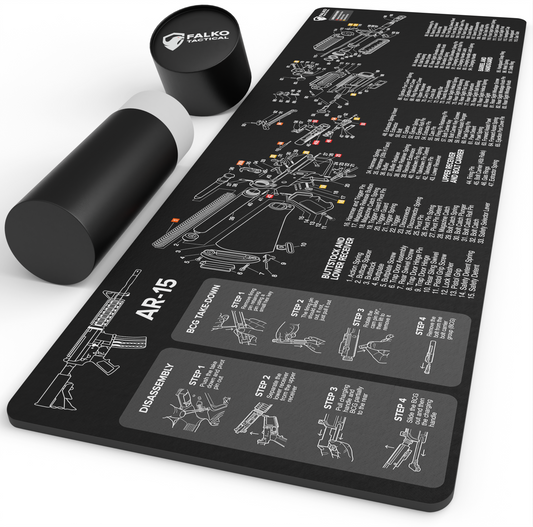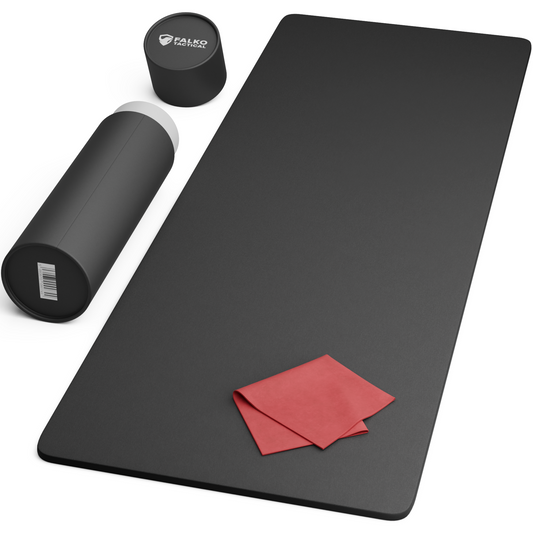
Best Gun Cleaning Mat 2024: Top Picks for Firearm Maintenance
Looking for the best gun cleaning mat? This guide breaks down what actually matters so you don’t waste money. We compare the three common gun mat materials and discuss: thickness, grip, solvent behavior, magnets, and sizing.
If you’re deciding on the best gun mat for real maintenance, this is straight advice from shooters who actually wrench on their gear. After testing a pile of options for years, we ended up building our own rubber-base, oil-resistant mats to fix the usual failures (see it at the comparison table at the end of the article).
Why a Gun Cleaning Mat Matters (more than you think)
The best gun mat does three jobs at once:
- Protects your bench/table/tailgate from oil, solvents, and scratches
- Stabilizes parts and tools so springs, pins, and screws don’t bounce or roll off
- Simplifies the teardown-to-cleanup cycle, so maintenance doesn't feel like a chore
If you’ve ever “made do” with towels or cardboard, you already know: spills spread, fibers stick to parts, and one bad slip can scar a stock, or your work surface.
What Gun Cleaning Mats are made of
| Material | Pros | Cons | Our Take |
|---|---|---|---|
| Felt | Cheap, soft under parts, light and easy to carry | Absorbs oil/solvent, holds smells, fibers cling to small parts, slides around | Fine |
| Hard Plastic | Zero absorption (easy wipe), molded channels, doesn’t hold smells | Spills travel, little cushioning, less bench protection, difficult to carry | OK for quick jobs; not our choice for full maintenance. |
| Rubber / Rubber + Neoprene Hybrid | Grips the bench, cushions impacts, oil and solvent repellant, easy to clean | Heavier than felt but still easy to carry; quality varies a lot by thickness | 🏆 Best all-rounder for real firearm maintenance. |
→ We prefer a rubber mat with an oil/solvent-resistant top. You get stability, surface protection, and sane cleanup.
The features that actually matter
Thickness & Cushioning
Look for ~¼" (≈6 mm) total build. Thin pads curl and slide; thicker mats absorb impacts, keep parts from bouncing, and actually protect the bench.
Grip & Flatness
A non-slip rubber base that lays flat. If a mat won’t stay put during a stubborn takedown, it’s not a shop tool.
Oil & Solvent Behavior
Light oils / CLP: should bead and wipe off the top easily.
Heavier solvents: the base should block leaks to your table; wipe and air-dry so they evaporate and the strong smell sweats out.
Surface Texture
Smooth, low-nap tops (neoprene-style) keep fibers off parts and make small hardware visible. Fuzzy surfaces love lint and carbon.
Printed Diagrams (Optional)
Great for beginners and training (look for diagrams with lube points). Pros often like blank universal mats for any platform.
🚩 Magnets - Friend and Foe
Magnetic zones/parts trays help corral tiny screws but can magnetize components and attract shavings into places you don’t want them. Use with care (or pair with a de-mag).
Size Guide
- Pistols / compact setup: 20 × 12 in
- Rifles / general use: 36 × 12 in (sweet spot for most benches)
- Full bench / multi-gun / parts galore: 48 × 17 in (true gunsmith mat)
If you’re torn between sizes, go wider.
Comparison of 5 Best Gun Cleaning Mat

Real Avid Universal Smart Mat
Big work area, wipe-clean top, and a built-in parts tray with little magnets that can help keep little parts organized during teardowns.
Where it falls short: Thin, doesn't stay totally flat, higher price for the padding you get.
Best for: Shooters who want space and like a magnet handy, light to moderate maintenance on a stable bench.

Raiseek Rifle Mat
Organized zones make sense for step-by-step work; rubberized bottom keeps it from skating. It has a small magnetic area, and it's available in different lengths.
Where it falls short: Has a polymer surface lets liquids pool; less cushioning; can keep roll memory and not lay fully flat at first.
Best for: Gunsmiths who value compartments over thick padding and mostly do low-spill cleaning.

Drymate
Budget mat that covers the table and protects from water through its backing good in a pinch.
Where it falls short: Felt surface is thin, traps lint shavings, absorbs oils and solvents, so it needs frequent cleaning and holds odor.
Best for: Occasional, light maintenance when price matters more than long-term durability or spill control.

OneTigris
Plenty of room, smart sections design and lots of cool magnets to corral parts during takedowns.
Where it falls short: Can crease or resist laying flat; magnets are heavy they may magnetize parts and attract shavings where you don’t want them. Unless you use a de-mag product it's a no go.
Best for: Users who prioritize parts control and don’t mind managing magnetization after the job.
What we’ve learned: thickness + grip + solvent behavior matter more than gimmicks. A thicker rubber-backed mat with a wipe-clean top will outlast cheaper options and protect your table. We don't fancy magnets and compartments design, we don't find them useful and that's...
Why We Ended Up Building Our Own Gun Cleaning Mats.

Falko Tactical Gun Cleaning Mat
After testing what felt like everything on the market, we wanted one mat that behaved like real shop gear:
- ¼″ (≈6 mm) total build for real protection
- Non-slip rubber base that locks to the bench or tailgate
- Oil-resistant top that wipes clean after CLP and common cleaners
- Platform options: AR-15 diagram, Glock Gen5 diagram, or Universal/Blank
- Black matte storage tube so it rolls, packs, and stays clean
If you want to see the details we obsessed over (and the sizes we recommend) you can our gun cleaning mat collection linked at the end of the page.
This table summarizes our take on these five gun mats.
| Mat | Material | Thickness | Highlights | Pros | Cons |
|---|---|---|---|---|---|
| Our Falko Tactical Gun Cleaning Mat | Rubber base + oil-resistant neoprene top | ¼" | Tube case; 2X thicker; AR-15 & Glock diagrams or universal | Stays flat, oil-resistant, easy wipe, machine washable | Slightly heavier than thin pads |
| Real Avid Universal Smart Mat | Rubber + oil-resistant top layer | ~⅛" | Large footprint; magnetic tray | Roomy, parts control, easy wipe, oil-resistant | Thinner, can wave/crease at first |
| Raiseek Rifle Mat | Polymer hard plastic | ~⅛" | Hanging holes; sections + magnetic area | Organization-friendly, no smell | Liquids can pool; less cushioning, comes rolled it may not lay totally flat |
| Drymate | Felt with backing | ~¹⁄₁₆" | Budget, USA-made | Multiple sizes, cheap | Traps lint/oil; cleanup hassle |
| OneTigris | Rubber + magnets | ~⅛" | Magnetic dots; hanging and rolling holes | Spacious, sticky base, multiple parts intervals | Creases; magnetizes parts over time |
Tips from the “we messed this up so you don’t have to”
- Skip ultra-thin pads (<3 mm). They slide, curl, and don’t protect anything.
- Felt/fiber mats soak oil and smell forever.
- Magnets are helpful—until they aren’t. Use them thoughtfully and pair with a de-mag.
- Roll, don’t fold. Folding can crease or crack inferior builds.
- Ventilate when using strong solvents. Wipe and air-dry the mat flat.
FAQ
Are thicker mats really better?
Yes. Around ¼" (≈6 mm) absorbs impacts, keeps pins/springs from bouncing, and actually protects your bench.
Will lighter colors look dirty?
If the top is oil-resistant, no—light oils and CLP wipe clean. For heavy chemical use, wipe and air-dry.
Do magnets help or hurt?
Both. Great for corralling parts. But magnets can magnetize components and attract shavings—use carefully.
How do I clean a gun mat?
Wipe with a rag/paper towel after use. For heavy solvents: wipe, then air-dry flat until evaporated. Roll or store flat; never fold.
What size do I actually need?
Pistols: 20×12. Rifles/most benches: 36×12. Big projects/multi-gun: 48×17.
Thank you for your attention, hope this was helpful.
Falko Tactical
Gear that goes the distance.




